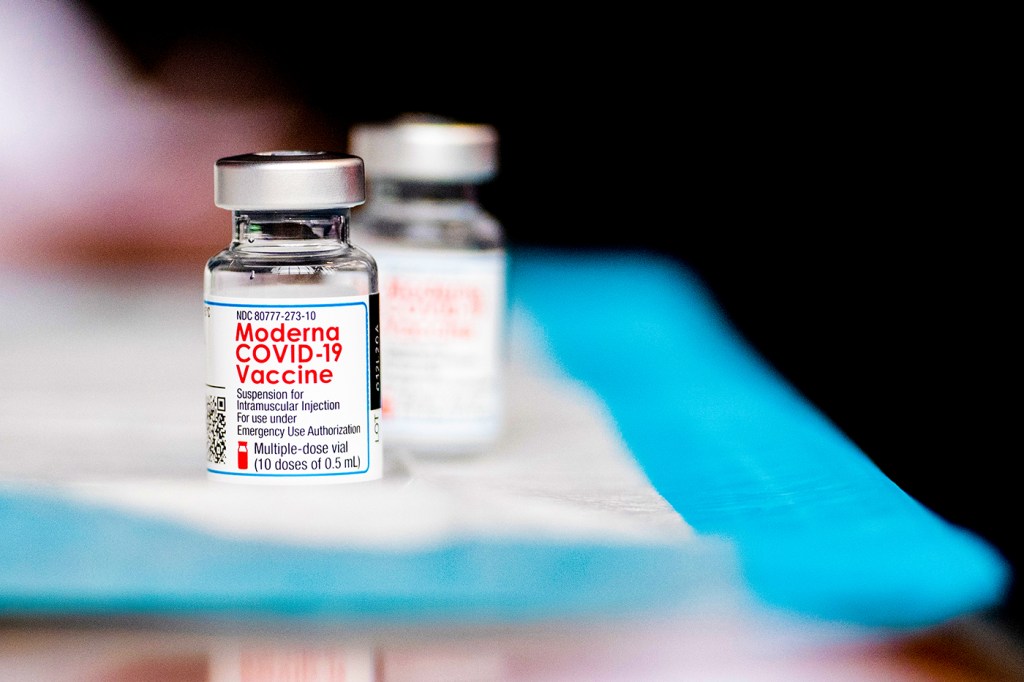This bioengineering co-op gets hands-on with Moderna’s COVID-19 vaccine

All Northeastern students hope to land a co-op that lets them wrestle with real-world problems while exploring their own academic interests.
For Ella Strzegowski, that combination of hands-on engagement and intellectual curiosity has been delivered in high doses. Since mid-July, the 20-year-old bioengineering student has been working for Moderna, maker of one of several widely distributed COVID-19 vaccines, in the company’s Norwood, Massachusetts, facilities.
Strzegowski’s specific task at Moderna is part of the company’s quality control measures, which both reduce production costs and are part of federal safety requirements. She uses a technique called chromatography to examine the molecules in the messenger RNA (mRNA) vaccine solution.
Simply put, chromatography is a method of separating molecules in a mixture, which in this case is the vaccine itself. As the pharmaceutical giant continues to scale up vaccine production, Strzegowski says the work of improving the vaccine solution is important because it ensures the vaccine remains safe, on top of reducing manufacturing costs.
It’s a fitting assignment, not only because it embodies the goals of Northeastern’s work-study program, but because it aligns with Strzegowski’s own sense of work she finds meaningful: that which is focused on helping as many people as possible, in the broadest possible way. It’s a moral imperative she says was handed down to her from her parents—and one that’s found expression in the sciences.
“My mom’s a pediatrician,” the Northampton, Massachusetts, native says. “Watching her treat patients, I first aspired to be like her.”
Naturally, she considered going to medical school when she was young; but in high school, Strzegowski developed a deep interest in biology. At Northeastern, the focus of her studies in bioengineering is on “cells and tissue,” which is one of three concentrations in the undergraduate program.

Ella Strzegowski, who studies bio engineering, is currently on co-op at Moderna. Photo by Matthew Modoono/Northeastern University
While at Moderna, Strzegowski has been part of a broader team focused on the mRNA process development, specifically on improving the manufacturing capabilities and efficiencies in order to scale up production and distribution of the still-in-high-demand COVID-19 vaccine.
So-called mRNA vaccines use viral genetic material to teach the immune system to respond to threats, as opposed to adenovirus vaccines, such as Johnson & Johnson’s, which use a weakened version of an actual virus. But the mRNA material is incredibly delicate, requiring storage at sub-zero temperatures to remain viable, which means widespread manufacturing and distribution is an ongoing challenge.
While mRNA research and development date back decades, the Moderna and Pfizer-BioNtech mRNA immunizations were the first to receive emergency use authorization from U.S. regulators in 2020.
At the onset of the pandemic, the Cambridge, Massachusetts-based company quickly became a key player in the effort to produce an effective vaccine for the virus, and has since grown into a company looking to service a worldwide demand for its product. Part of that growth has meant a significant upscaling of production and operational expansion and, thus, many more jobs.
With new faces proliferating around her seemingly every day, Strzegowski says it’s an exciting time to work for a company that’s been so pivotal in combating the pandemic.
“New teams are being created and projects are getting shifted around constantly,” she says. “Even though it may be a little chaotic to experience that growth, to be a part of it is amazing. It’s definitely a great workplace.”
Strzegowski says there is a vast division of labor across the company, with teams working on every conceivable problem across numerous biotech projects, spanning vaccines and other drug therapies, to novel cures for rare diseases.
“Some of the biggest issues with our mRNA process is the high cost to manufacture and time it takes to produce,” Strzegowski says. “By reducing the cost and decreasing time we would be able to produce a lot more mRNA and be able to supply it at lower costs, which is super important when supplying to low income countries, or developing personalized cancer vaccines which can [cost] upwards of tens of thousands [of dollars] per treatment.”
The work, she says, is not exclusive to the COVID-19 vaccine. New methods and strategies for streamlining and refining production can be applied to the development of other therapies, Strzegowski says.
For media inquiries, please contact media@northeastern.edu.






